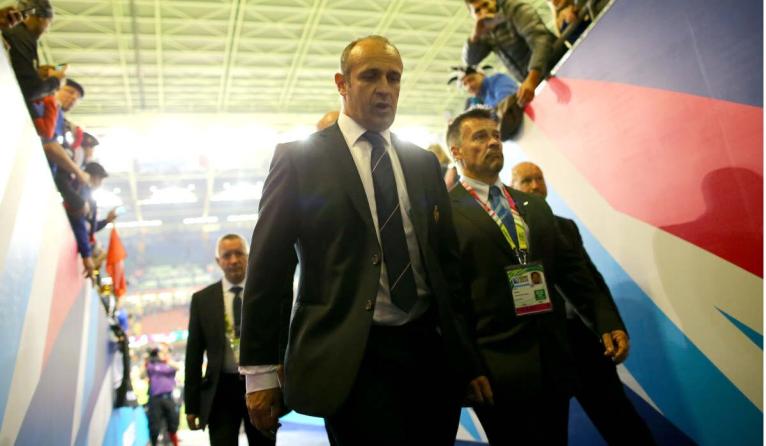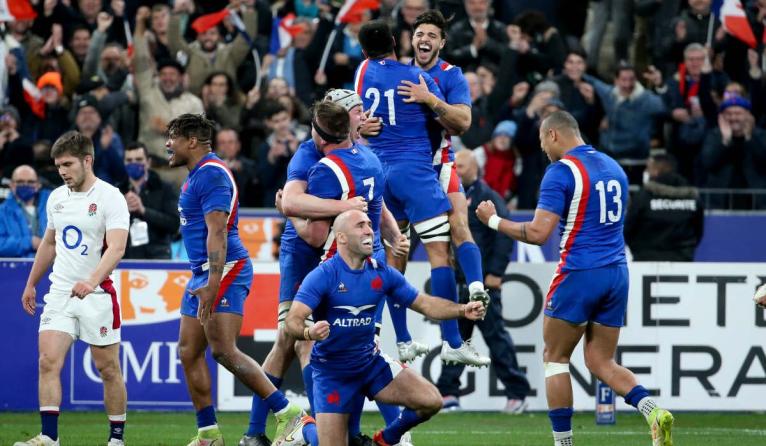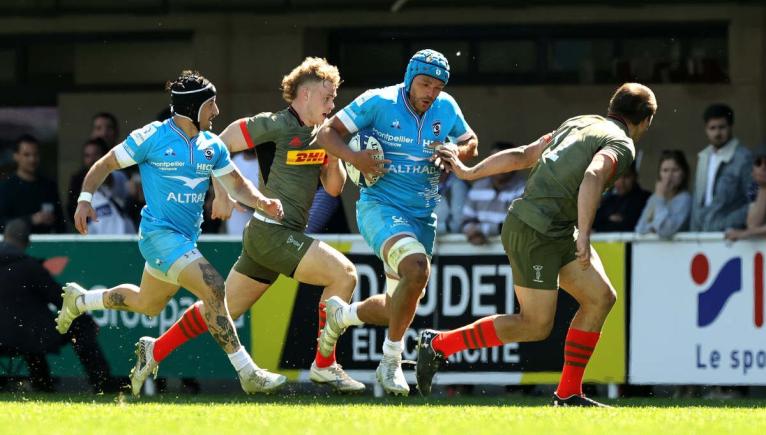I was at the Principality Stadium on October 17 2015 when New Zealand thrashed France 62-13 in the quarter-final of the world cup. It was a crushing defeat, one which scarred a generation of players. For the coach of France, Philippe Saint-André, it was the nadir of four years in charge of the Bleus. Of 47 Tests his side had won only 20, and in four Six Nations championships France had never finished higher than fourth.
France had become a joke, so, too Saint-André who stumbled off into an uncertain future. ‘We took a beating against the All Blacks but I had made my decision before then,’ he told an interviewer in December. ‘I didn’t ban myself from coming back [to rugby] but first I had to take a break of two years. It lasted four years and a half years.’
Saint-André did some television commentary during his sabbatical from coaching. He also thought about his career and whether he wished to return. ‘After three years I began to get the taste to take on a new challenge.’
Saint-André’s biggest mistake was taking the French job in the first place, although it requires an exceptional iron will to turn down such an honour. Isn’t coaching one’s country the pinnacle of any coach’s career? To Saint-André, add the names of Brian Ashton, Gareth Jenkins, Matt Williams, Vern Cotter and Guy Noves, superb coaches who failed to transfer their club success to the international arena.

What must have made it all the more galling for Saint-André was that as France lurched from one lame performance to another, the club he had left was conquering Europe. Saint-André had been hired by Toulon owner Mourad Boudjellal in 2009 with a simple brief: use my money to turn the club into Europe’s finest. When Saint-André left in the autumn of 2011 he had laid the foundations of a powerhouse. He had brought in Jonny Wilkinson, Matt Giteau, Carl Hayman, Mathieu Bastareaud, Steffon Armitage and Juan Martín Fernández Lobbe, the nucleus of the side that won an unprecedented hat-trick of European titles between 2013 and 2015.
There were probably many times during his four years of France when Saint-André wished he was back at Toulon. I remember visiting the club in 2010 for a feature I was writing about the club’s ambitious plans. I did a training session in their spanking new gym with Pierre Mignoni, then the scrum-half and now the coach of Lyon, and talked to Wilkinson, Tom May and Paul Sackey about life at the Cote d’Azur club. Saint-André passed through at one moment, checking on his boys, exchanging banter.
We broke a generation of players. Players like Yoann Maestri and Wesley Fofana played 42 matches a season during three years. Our system killed them. I feel bad about it.
Philippe Saint-Andre
And that is the difference between coaching a club and one’s country: the intimacy and the influence that a coach has with his players. It’s much easier to stamp one’s personality over a club side; look at Guy Noves, who, during 22 years at Toulouse dominated every facet of the club. When he replaced Saint-André as coach of France after the 2015 RWC Toulouse went into a rapid decline, even failing to make the Champions Cup in 2017-18. In that same season Noves was sacked as coach of France after a chaotic two years.
Like Saint-Andre, he learned the hard way that coaching a club and a national team requires a whole different skill set. A national coach has little contact with his players for weeks at a time and then suddenly they come together for a brief but intense period. There is little time for adjustment or acclimatisation; it requires dexterity and flexibility for players and coaches.
Then there are the factors outside one’s control. Saint-André was delighted as any French fan by the Bleus’ recent Grand Slam, their first Six Nations title since 2010, but nonetheless he allowed himself a wry reflection when he appeared on TV. Marvelling at the judicious management of this current France squad, he admitted that during his tenure: ‘We broke a generation of players. Players like Yoann Maestri and Wesley Fofana played 42 matches a season during three years. Our system killed them. I feel bad about it. I battled to change it but I couldn’t do it quickly enough.’

Saint-Andre’s figures were slightly exaggerated but his point is a valid one; Maestri, the Toulouse at the time, played 27 club matches and ten Tests in the 2012-13 season. During the 2014-15 season (incorporating the autumn RWC), Toulon hooker Guilhem Guirado played 22 club matches, including nine in Toulon’s triumphant European Cup campaign, and 15 Tests. In the 2020-21 season, Antoine Dupont played 20 matches for Toulouse and seven Tests for France, and so far this season he has played 15 matches for Toulouse and eight for France.
Saint-André is right to talk of a lost generation who never consistently lived up to their early promise, players such as Maestri, Fofana, Camille Lopez, Rabah Slimani, Louis Picamoles, Jefferson Poirot and Morgan Parra.
They and Saint-André were caught in the crossfire of a vicious war between the FFR and the LNR (National Rugby League) as both sought to become the dominant force in French rugby.
Montpellier’s owner, Mourad Altrad, believes Saint-André his assistants of Olivier Azam and Jean-Baptiste Élissalde are building something special and earlier this month he extended their contracts until 2025
Peace was finally brokered and now France is prospering, the national side and the clubs. Four of them are in the quarter-finals of next month’s Champions Cup, including Saint-Andre’s Montpellier, their first appearance in the last eight since 2012-13.
They are also leading the Top 14 and all but assured of qualification for the knockout phase of the competition. It’s in marked contrast to when Saint-André was appointed head coach in January 2021; then Montpellier were 13th in the league and shorn of morale.
Montpellier’s owner, Mourad Altrad, believes Saint-André his assistants of Olivier Azam (forwards) and Jean-Baptiste Élissalde (backs) are building something special and earlier this month he extended their contracts until 2025.
For Saint-André it’s a vindication of sorts. He was never a bad coach, as he demonstrated with Sale and Gloucester in the Noughties, but he is one whose talents are more suited to the day to day challenges of a club.

In contrast Fabien Galthié has proved far more adroit running a national team than he did coaching Stade Français and Montpellier. He had a reputation as a volatile and divisive club coach, allegedly alienating several players with his brusque behaviour. It’s easier to manage players when you are not cheek by jowl for nearly 365 days of the year. A national coach can discard players safe in the knowledge that any resentment will be taken back to their clubs, and not the dressing room where petty grievances may fester and cliques develop.
It is perhaps of little surprise that Eddie Jones prefers coaching national teams to club sides. His autocratic style, his apparent indifference to establishing empathetic relationships with his charges, would not work well in a club.
Then again, it hasn’t been working particularly well with England for a couple of seasons and the RFU announced last month that they will appoint his successor before the 2023 World Cup. Among the names mooted is Exeter’s Director of Rugby Rob Baxter, who has been associated with the club since he played for their youth side in 1987. For the last 16 years he has been in charge of their senior squad, transforming the Devon club into one of Europe’s top sides.
Saint-André remarked recently that he ‘felt freer’ at Montpellier than he did coaching France. It shows in his demeanour and in the results of his team.
Does that make him right for England? It’s a question Baxter has asked himself for a number of years. “It would depend if I’m happy here, wouldn’t it?” he said when asked about the England job in 2020. Last month the subject was again raised. “I would be happy to have a chat about what the role is,” said Baxter. “What role is it? Is it a DoR-type role? Someone who brings in a coaching team and is prepared to work with those guys? Is it an on-field guy…What do [the RFU] want to see? Then you might genuinely see guys saying ‘right, that’s a role for me’ or ‘that’s not a role for me’.”
Baxter is right to be cautious. Would the England job be right for him, and would he be right for England? How would he handle the media attention, for instance, which would be far more intense than it is now?
Saint-André remarked recently that he ‘felt freer’ at Montpellier than he did coaching France. It shows in his demeanour and in the results of his team.



Comments
Join free and tell us what you really think!
Sign up for free